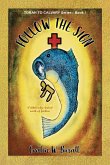The inevitable, absorbing, yet invigorating world of the chaplaincy awaits. This objective journey into The Sign of the Fish begins in 1770, on a Massachusetts bridge. By comparing real cases in therapeutic settings or witnessing great personal changes the chaplain deals with, much is learned. Today's chaplain covers cases from hospital to campuses, from military bases to prisons, from retirement homes to sports arenas, to shipboard, hospice and abroad; volunteer or professional, all are trained. A chaplain's obedience is to the God each serves. Read why the chaplain asks, "And how did that make you feel?"-the answer that allows withheld tears and feelings to flow. A newspaper reporter's style keeps the book informative but simple, honest but confidential, allowing participation in the conflict and debate that introduces the field of bio-ethics. The book, in its later segment, introduces ancient religions. The spiritual attitudes of the eight chaplains and two professional writers, a professor and a nurse, give the book the special ambiance they gained from their religious experiences. A one-time student of Professor Elie Wiesel at Boston University, the author's humanizing of spiritual care was well learned. She chose her contributors well. Carefully explained is why each of the chaplain's venues required additional training in the ancient religions in this ecumenical world. Of special interest are the images on loan from Irlen Institute that explain the frequently undiagnosed perception difficulties of our non-readers in elementary schools and into our colleges and businesses. One New England hospital with an entire floor empty brought in reading specialists to work with the community's non-readers of all ages. Many industrial firms now test for scotopic sensitivity before hiring.
Bitte wählen Sie Ihr Anliegen aus.
Rechnungen
Retourenschein anfordern
Bestellstatus
Storno








